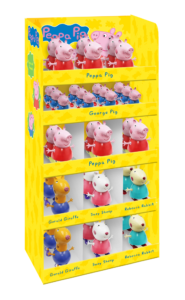With the increased time spent at home, with family, and the surge of the UK’s population turning to the garden space and gardening hobby as a means of exercise and ‘back to nature’ entertainment, it really shouldn’t come as a surprise that the market has become one filled with potential for the licensing space to tap into.
It was only at the end of last month that garden and gardening specialist, Primus, took home a double award win at Glee Gathering, where its range of Peppa Pig garden ornaments triumphed in both the Best of British Award and Best Garden Decoration Award categories.
The win underscored an interesting and undeniable shift in the landscape; one that Steve Perry, head of marketing at Primus, reaffirms when he tells Licensing.biz that “the garden industry desperately wants to see more licensed products in the marketplace.” It’s something the licensee spotted when it first struck up partnerships with Aardman for Shaun the Sheep and Wallace and Gromit garden ornaments, or with RSPB for its hand crafted wooden bird gifting range, and continues to see today with the success of its latest partnership with Hasbro: the market for brands in the gardening space is currently blooming.
Licensing.biz catches up with Perry, head of marketing at Primus to explore the market, why the hobby is finding younger and younger audiences, and why now is the right time for the licensing industry to be sowing the seeds for a fruitful venture in the back garden.

Hi Steve, it’s good to explore the garden with you and congratulations on the recent award wins. Seeing a licensed product take the win across two categories, how reflective do you think this is of current trends in the garden/gardening market?
I think the garden industry desperately wants to see more licensed products, having our range of RSPB hand carved wooden birds shortlisted for the same award last year also backs this up. The judges are looking for something new and original and licensed products in this category hasn’t been done like this before (other than us in other ranges).
After a very successful run from our Shaun the Sheep licensed products we decided that we would expand our licensing portfolio, so I reached out to the licensing agency behind the IP on the idea of translating the ever popular Peppa Pig characters into an ornamental form suitable for the home and garden, which they were incredibly receptive to. A deal was soon made and then after a lengthy development stage the final products have been released and all are in agreement that they are fantastic, the initial market feedback speaks for itself.
It’s here that the licensing category manager at Hasbro, Zahara Gul told us that given that the show is ‘very much about first experiences’, the team is “looking forward to working with Primus to extend the garden offering to get kids involved with nature.”
You guys mention other licensed lines in Shaun the Sheep and Wallace and Gromit. What potential do you see for the world of licensing in the garden and gardening market?
We feel that brand licensing in the garden sector is a large growth area, you don’t see the same kind of licensing activity like you do in other sectors and licensors now are definitely starting to realise this. In particular we feel this is the case with younger audiences who are heavily bought into brands and characters and no doubt in part why our new range Peppa Pig and friends did so well at this year’s Glee Gathering winning two awards – Best of British and Best Garden Decoration categories.
So far the response from the trade has been the best we’ve ever had to a new licensed product collection. We knew Peppa Pig would be popular but we doubled our initial order quantity purely from the demand generated by our pre-order catalogue. We know our retailers’ customers are going to love these ornaments, as well as the more than 200 other new products for the 2021 season. We loved them from the start but we were unsure what the reaction would be from the trade and customers.
Being shortlisted for best new product at the Glee Gathering 2020 and with the volume of pre-orders coming in we are glad everyone likes them as much as we do and I think this is simply going to open more doors for the world of licensing and the gardening market. It is certainly pivotal to our plans going forward.

What sort of increase in interest in gardens and gardening have you seen in terms of customers and audiences as a result of the UK lockdown measures? Has this fueled growth in the market?
Like many industries, the current pandemic has certainly had an impact on the gardening sector, but thankfully it’s potentially had a very positive long term impact in this particular sector, The Horticultural Trades Association states that ‘almost three million gardeners sprung up this year as a result of lockdowns.”
The pandemic has created a new generation of enthusiasts who have found the joy that can be had from their garden and we hope people continue to embrace this new found love of gardening especially the younger, family demographic we are seeing a big increase in.
Arguably the success of the Peppa Pig range suggests that more families are taking it up as an ‘at home’ hobby. Would this be the main market for licensed garden products? What do you look for in a licensing partnership or property to work with?
To this point garden gift and decor has been our area of focus, I would agree that part of Peppa’s success has been due to the family appeal but there is a huge amount of scope to be had with brand licensing in the garden sector.
For us, when choosing a license partner to work with we do not necessarily look for trends or fads, instead we look at characters and brands that have stood the test of time and can almost be seen as “classic”, certainly this is the case for our Aardman collection, with Wallace and Gromit having their 30th anniversary last year.
Unlike with plush for toy industry where licenses are based heavily on what’s hot right now, I think the gardening market appreciate heritage and something that is lasting.

What does the current licensed range at Primus span? Have you got plans to build on this? What plans have you got for tapping into the younger audiences?
Currently Primus has focused heavily on decor and gift lines such as Aardman metal garden ornaments, our RSPB hand carved wooden birds and now Peppa and friends, garden decor is the core of what we distribute at Primus with over 500 other non-licensed products in the category. However we do see that there is a real movement right now to encourage young gardeners and get them into the hobby from a very young age.
There’s a huge amount of positive experiences that can be had by introducing children to gardening and research suggests children perform better at school if they’re involved with gardening, as well as it being a healthy and active hobby as opposed to video games and other not so stimulating interests’ younger generations can have.
Working with our existing licensors and potentially some new partners we feel that Primus could help to lead the way by using some of their favourite characters to help inspire them to engage into this new activity and get a lot of joy from it.









